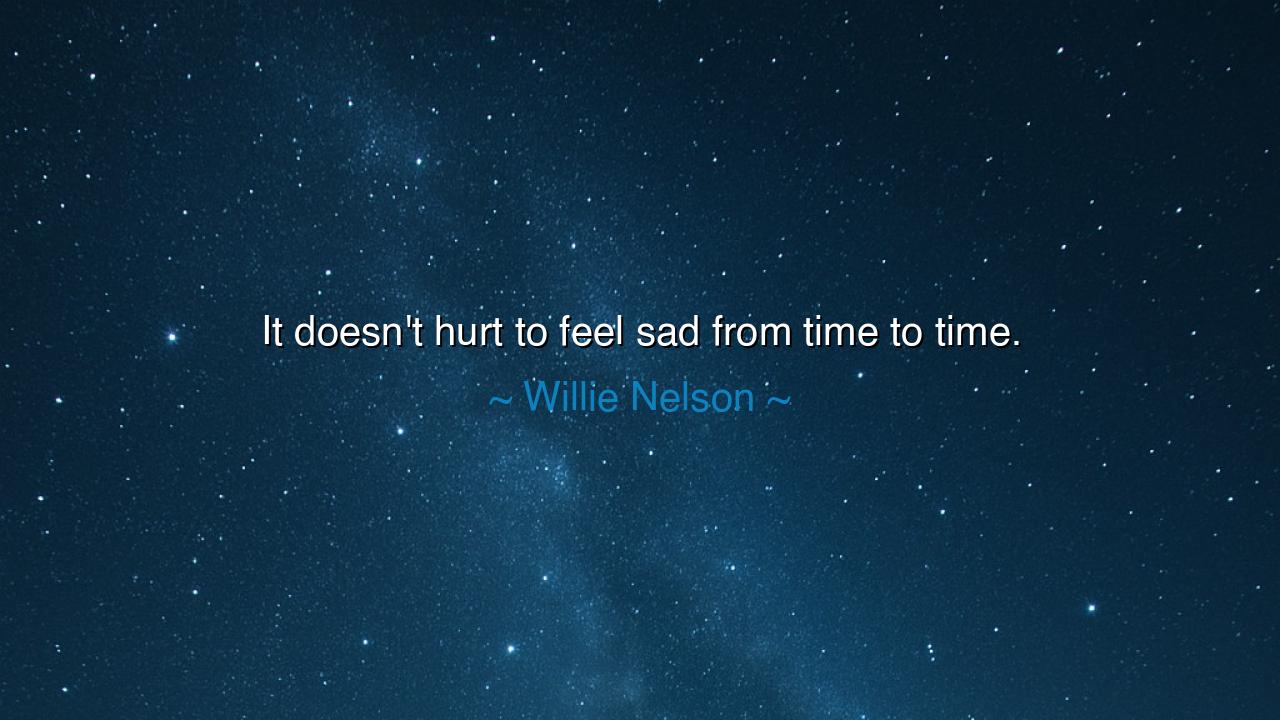
It doesn't hurt to feel sad from time to time.






The gentle wisdom of Willie Nelson shines through his simple yet profound words: “It doesn’t hurt to feel sad from time to time.” In this brief sentence lies a truth older than any song — that sorrow, when embraced with humility, is not a curse, but a teacher. The ancients knew this: that to live fully is to feel deeply, and that sadness, though it stings, cleanses the heart like rain upon parched earth. Nelson’s words do not glorify grief, but honor it. They remind us that to deny sadness is to deny our own humanity, for even the strongest oak must bow to the storm before it can rise again.
There was a time when people believed that to feel sadness was weakness, but the wise have always known otherwise. The poets of old spoke of melancholy as the shadow of joy — inseparable from it, necessary to it. Just as the dusk follows day, sorrow follows happiness, and both are needed for the soul to grow in understanding. To feel sad is to be alive, to know the tender ache of the human condition. Those who feel nothing, who flee every tear, may think themselves strong — but their hearts are barren fields, untouched by the gentle storms that bring new life.
In Nelson’s quiet voice, there is the calm of one who has lived through both pain and peace. His life, filled with both triumph and loss, lends depth to his words. He is not a man preaching from comfort, but one who has walked the long road of love, heartbreak, and resilience. His music, like his quote, is born from the courage to feel — to let sadness come and go, as naturally as the wind through the plains. In those moments of sorrow, he finds not despair, but renewal — a return to simplicity, to truth, to gratitude for the fleeting beauty of life.
Consider the story of Abraham Lincoln, who bore the weight of a nation at war and yet often fell into deep sadness. He called it his “melancholy,” a companion that followed him through victory and loss alike. But rather than curse it, he learned from it. It made him tender where others were cruel, patient where others were rash. It softened his leadership with compassion and humility. Lincoln’s sadness, like Nelson’s wisdom, teaches us that sorrow refines the soul, shaping empathy and wisdom where pride once stood.
The ancients would have likened sadness to the winter of the spirit — cold, yes, but also necessary. For just as the earth must rest before spring can bloom, so must the heart fall silent before it can sing again. To feel sad from time to time is to let the spirit breathe, to make room for reflection. It reminds us of what truly matters — love, kindness, connection — for only when we have lost or longed do we truly understand their worth. Sadness awakens gratitude in the same way night makes the stars visible.
And yet, in this truth lies a warning as well: sadness must be felt, not worshiped. One must walk through it, not dwell within it forever. The wise do not drown in sorrow — they learn to swim through it. When sadness comes, welcome it as a traveler bearing wisdom. Listen to what it teaches, and when it departs, let it go with grace. Those who fight against their own feelings often suffer twice — once in pain, and again in resistance. To simply feel, as Nelson says, is to heal.
The lesson is thus both tender and timeless: do not fear sadness; befriend it. When it visits you, let it remind you that you are still alive, still capable of love, still human. Do not rush to banish it with noise or distraction. Sit with it awhile. Write, sing, pray, or walk beneath the open sky. Let your tears water the roots of your spirit. For when they dry, you will stand stronger, softer, and more alive than before.
So, children of tomorrow, carry this truth within you: the heart that allows itself to break also learns how to mend. As Willie Nelson reminds us, it does not hurt to feel sad from time to time — it heals. It humbles. It opens the door to deeper joy. For life, in its fullness, is not a song of endless laughter, but a symphony of light and shadow — and both are needed to make it beautiful.






AAdministratorAdministrator
Welcome, honored guests. Please leave a comment, we will respond soon